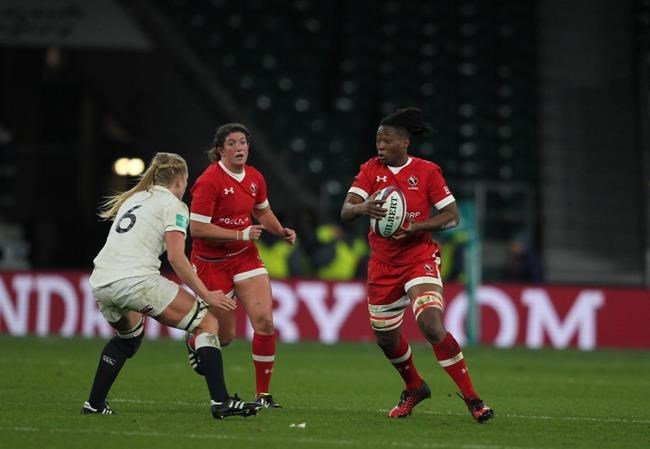Commit a transgression on Canada's World Cup rugby team and chances are you'll have to answer to Latoya Blackwood.
"She's the sheriff," says coach Francois Ratier.
As such, Blackwood presides over in-house disciplinary matters and decides the consequences. A powerful lock forward who can also play in the back row, Blackwood has made more than a few opponents pay as well.
"She doesn't need space, she's going to create her own by bulldozing people," flanker Karen Paquin said admiringly.
Third-ranked Canada opens World Cup play on Aug. 9 in Dublin against No. 23 Hong Kong, with group games against No. 10 Wales and No. 2 New Zealand to follow.
Blackwood, who turns 32 on Aug. 19, is one of 18 returnees from the 2014 World Cup squad that lost 21-9 to England in the final in Paris.
Her rugby future was in doubt, however, after an April leg injury during a club game prevented her from taking part in the June tour of New Zealand. Blackwood is reluctant to detail the injury.
"The initial diagnosis, it seemed like I was going to write my retirement letter, unfortunately," she said. "But after a second look, things were not as serious as it seemed. So with a lot of work and a lot of recovery and treatment, I'm able to get back where I was before the injury."
Blackwood credits Ratier's support — and patience — for helping her get through the injury ordeal.
Rugby has been Blackwood's saviour in a variety of ways. It has helped her get up after getting knocked down.
"She's Rocky Balboa," said Ratier. "She's the one who's come from the streets and had to fight every time to be at this level. She's also had to fight against herself sometimes."
Rugby, says Ratier, has helped her share her emotions and sharpen her communication skills.
"Now she's super-open. She's a great teammate ... a great leader on the field."
The support of her teammates and coaches was key after the 2014 World Cup when Blackwood's mother died suddenly.
"That kind of left me in a very deep dark pit and I really didn't know what to do with my life after that," she said. "I would definitely say that I was very depressed."
Blackwood, who was then living in Montreal, credits Ratier and forwards coach Gary Dukelow, among others, for helping her get through it.
"I had a lot of teammates that essentially became my family and helped me out of that dark time," she said. "My mum always told me to go after my dreams and to be the best, because I was very shy as a kid. And she always told me to just try and put myself out there."
Blackwood has dedicated her preparation for this World Cup and the tournament itself to her mother.
"I know she would be proud of it," she said.
Blackwood has Toronto roots but lived in Montreal for almost a decade. She has spent the last 10 months in Victoria to maximize her rugby training.
A former basketball player, Blackwood discovered rugby in high school where she played on the boys team in her last year. The physical nature of the game appealed to her and she joined a club in Brampton.
Her dedication to the sport has taken her to the highest level thanks to her work ethic and intensity.
"She's super-powerful and she's one of the most dedicated persons that I know of," said Paquin. "She put her mind to playing rugby and ... does everything at 100 per cent."
Her skills took her to Toulouse, France, for a year in 2015. It wasn't quite professional, but the club paid for her accommodation and helped her out while her rugby education continued.
"I had a great time. It's a rugby-crazed city ... I learned a lot in terms of rugby," she said.
"I'll be forever grateful for that experience," she added.
Unlike the men's 15s team and the men's and women's seven sides, Ratier's squad is not officially centralized and the players do not receive carding money, although some get help from their provinces.
All have made sacrifices to pull on the Maple Leaf.
"Unfortunately, but it's getting better thanks to the Monty Heald Fund," Blackwood said.
Thanks to donations to the fund, named after the late Rugby Canada president, the women no longer have to pay their own way outside of the World Cup.
"It's a huge financial relief," said Blackwood. "Some of the players are able to take time off work to focus on training.
"It's really hard to compete against the best when the best have full-time contracts and they're training full time. But with the Monty Heald Fund, it kind of makes things a little bit easier."
Blackwood gets a modest stipend from the province of Quebec, which supports its athletes. She also works "from time to time" but took the month off prior to the World Cup to focus on getting ready.
Blackwood's fiancee, a teacher who will be on hand to cheer Blackwood on at the World Cup, also helps with the bills.
"She's been amazing. She's kind of been the bread-winner," Blackwood said.
Follow @NeilMDavidson on Twitter
Neil Davidson, The Canadian Press

